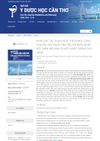 1 citations,
March 2023 in “Applied sciences”
1 citations,
March 2023 in “Applied sciences” Lavender, lemongrass, rosemary, and chamomile essential oils may help protect cells important for hair growth from damage and could promote hair growth.
January 2025 in “Molecules” Caffeine may help with hair loss, but more research is needed to confirm its effectiveness.
December 2024 in “International Journal of Molecular Sciences” Targeting CXCL12 may help treat hair loss caused by androgens.
 July 2023 in “International Journal of Molecular Sciences”
July 2023 in “International Journal of Molecular Sciences” N,N-Dimethylglycine Sodium Salt helps reduce skin inflammation and improves skin cell growth and healing.
 January 2014 in “Journal of Pharmaceutical Negative Results”
January 2014 in “Journal of Pharmaceutical Negative Results” Liquorice and Indian jujube root extracts don't help in fighting male pattern baldness.
 1 citations,
January 2020 in “Indo global journal of pharmaceutical sciences”
1 citations,
January 2020 in “Indo global journal of pharmaceutical sciences” Citrullus colocynthis and Citrullus lanatus have potential health benefits but may also cause reproductive toxicity.
 12 citations,
January 2021 in “International Journal of Biological Sciences”
12 citations,
January 2021 in “International Journal of Biological Sciences” Scientists successfully edited a goat's genes to grow more and longer cashmere hair.
 2 citations,
January 2023 in “BioMed Research International”
2 citations,
January 2023 in “BioMed Research International” Beetroot extract nanogel may help treat hair loss caused by testosterone.
 May 2023 in “Tạp chí Y Dược học Cần Thơ”
May 2023 in “Tạp chí Y Dược học Cần Thơ” The shampoo with grapefruit peel and Gleditsia sinensis helps mice grow hair faster, more, and longer.
5 citations,
March 2022 in “Frontiers in Medicine” PRP is effective for treating hair loss, especially with other treatments.
 4 citations,
August 2022 in “The Scientific World Journal”
4 citations,
August 2022 in “The Scientific World Journal” Merremia peltata leaf extract, particularly the bufotalinin compound, shows potential for treating hair loss.
 2 citations,
April 2023 in “Pharmaceuticals”
2 citations,
April 2023 in “Pharmaceuticals” Scopolin and scopoletin from Merremia peltata leaves may help treat hair loss and showed promising results in rabbit tests.
 1 citations,
March 2023 in “Phytochemistry Reviews”
1 citations,
March 2023 in “Phytochemistry Reviews” CBD may improve skin and hair health, but its effective use and safety need more research.
 1 citations,
March 2022 in “Journal of Dermatological Science”
1 citations,
March 2022 in “Journal of Dermatological Science” Adding TERT and BMI1 to certain skin cells can improve their ability to create hair follicles in mice.
Transplanted rat hair follicles grew hair and had increased but not fully restored nerve connections in mice.
 2 citations,
June 2022 in “Cosmoderma”
2 citations,
June 2022 in “Cosmoderma” Regenerative medicine shows promise for improving hair and skin but needs more research for standard use.
 July 2023 in “Pharmacognosy Magazine”
July 2023 in “Pharmacognosy Magazine” Cerasus serrulata flower extracts have strong antibacterial and antioxidant effects and may help prevent hair loss.
 May 2023 in “Scientific Reports”
May 2023 in “Scientific Reports” The seed extract of Lepidium sativum L. can potentially treat hair loss, showing effects similar to 5% minoxidil.
 5 citations,
February 2017 in “Biomolecules & Therapeutics”
5 citations,
February 2017 in “Biomolecules & Therapeutics” 4-O-Methylhonokiol helps protect skin cells from growth-stopping effects of a protein by regulating growth-related pathways.
 1 citations,
July 2017 in “Clinical research in dermatology”
1 citations,
July 2017 in “Clinical research in dermatology” Hair loss, known as Androgenetic Alopecia, is often caused by hormones and can be diagnosed using noninvasive techniques. Treatments include topical minoxidil and oral finasteride, with new treatments being explored. There may also be a link between this type of hair loss and heart disease risk.
 2 citations,
May 2022 in “Horticulturae”
2 citations,
May 2022 in “Horticulturae” A plant protein biostimulant improved growth, photosynthesis, and nutrient content in hydroponically grown basil.
 1 citations,
February 2017 in “MOJ bioequivalence & bioavailability”
1 citations,
February 2017 in “MOJ bioequivalence & bioavailability” Treating hair loss effectively may require a multi-sided approach, using different treatments together, and topical treatments could be more effective and safer than oral ones.
6 citations,
January 2013 in “Journal of Ayurveda and integrative medicine” The detoxification process made Abrus precatorius seeds safe and effective for use.
 7 citations,
June 2022 in “Frontiers in Medicine”
7 citations,
June 2022 in “Frontiers in Medicine” ADSC-derived extracellular vesicles show promise for skin and hair regeneration and wound healing.
4 citations,
November 2022 in “Nutrients” Cow placenta extract has strong antioxidant effects and can delay skin aging in mice.
119 citations,
June 2021 in “Heliyon” Licorice has many health benefits but should be used carefully due to possible side effects.
 2 citations,
June 2023 in “Plants”
2 citations,
June 2023 in “Plants” Sugars from Sargassum and brown algae may have health benefits like fighting viruses and helping with wound healing, but there are challenges in using them.
4 citations,
January 2024 in “Environmental Research” Using seaweed-based amendments improves soil quality and boosts rice growth and yield.
 June 2024 in “Computational and Structural Biotechnology Journal”
June 2024 in “Computational and Structural Biotechnology Journal” Multi-omics techniques help understand the molecular causes of androgenetic alopecia.
KRTAP6 genes affect wool quality in sheep.




















